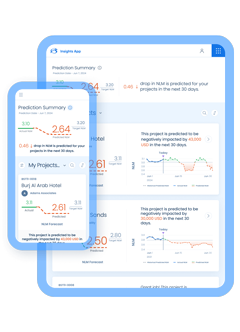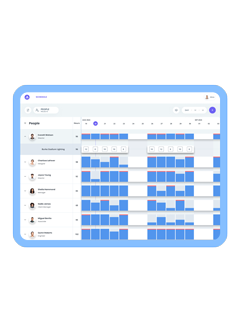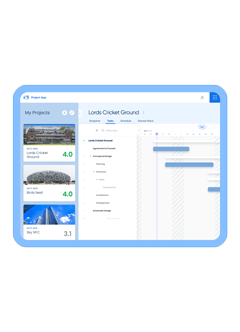
Project management style has a direct effect on project profitability. Earned value management (EVM) is a powerful project planning and management tool government agencies and many AEC firms use to integrate a project’s cost with the scope of work, project schedule and various performance elements. Using this approach makes project planning and resourcing more precise, resulting in better overall contract performance.
EVM is especially useful in project management because it measures progress objectively by providing:
- concrete performance measurement data using earned value metrics
- supporting data necessary to accurately predict costs, contract milestones and other events
- current information about direct costs and deviations from plans or schedules
Having this information available while a project is underway means a firm can make proactive, data-driven decisions to keep the project on schedule and within budget.
EVM differs from traditional, financial-based project management because it takes into account performance metrics, such as the contractual value of work, the value of work that has been earned and the cost of work performed. With this information, project managers can share contract execution data with essential personnel to quickly anticipate, identify and act on potential problems that could impact a project’s profitability. This project management style becomes even more effective with formulas applied to subsets of information like work breakdown structure, labor and expenses, allowing project managers to calculate, evaluate and manage the value earned for the work performed.
While EVM has been in practice since the 1960s, it’s only recently begun gaining widespread popularity within the AEC space. We have made a list of the most relevant terms and definitions to help our fellow AEC professionals understand EVM and how adopting it can positively impact project management.
- Actual Cost
- The cost incurred for completed work, including employee costs, expenses and overhead cost
- Ahead of or Behind Schedule
- A project’s progress, whether it is earlier (ahead of schedule) or later (behind schedule) than planned
- Backlog
- An accumulation of contractual work that has not yet been completed
- Budget
- The amount of money allocated to implement a project and produce deliverables (See also planned value)
- Earned Value
- The amount of work executed against the budget and reported as revenue
- Earned Value Management
- A project management technique that uses performance and financial metrics to determine the profitability of a project
- Effort
- The total of labor and expense charges based on the markup as described in the fee schedule
- Effort at Completion (EAC)
- The estimated value of work expended to complete a task or project
- Over Budget
- A project that has accumulated more effort than the agreed contract budget
- Percent Complete
- The progress of an activity or other element of the project structure plan expressed as a percentage:
Earned Value Budget
- Planned Value
- The amount of income a firm expects to earn for work performed
In a nutshell, earned value management allows AEC professionals to document, track, analyze, and control potential projects through the various stages of the sales process, ultimately leading to more accurate planning and execution — two aspects vital to profitability. To learn more about EVM and its applications in AEC, read “An Introduction to Earned Value Management” and “The Top 3 Concepts Every AEC Project Manager Should Know.”
BST Global offers solutions specifically aimed at helping AEC firms optimize project profitability, including through EVM. Check out BST11 ERP, the AEC industry’s first consumer-grade, project-driven and collaborative ERP solution. For more information on BST Global’s project intelligence™ solutions, visit BSTGlobal.com.









